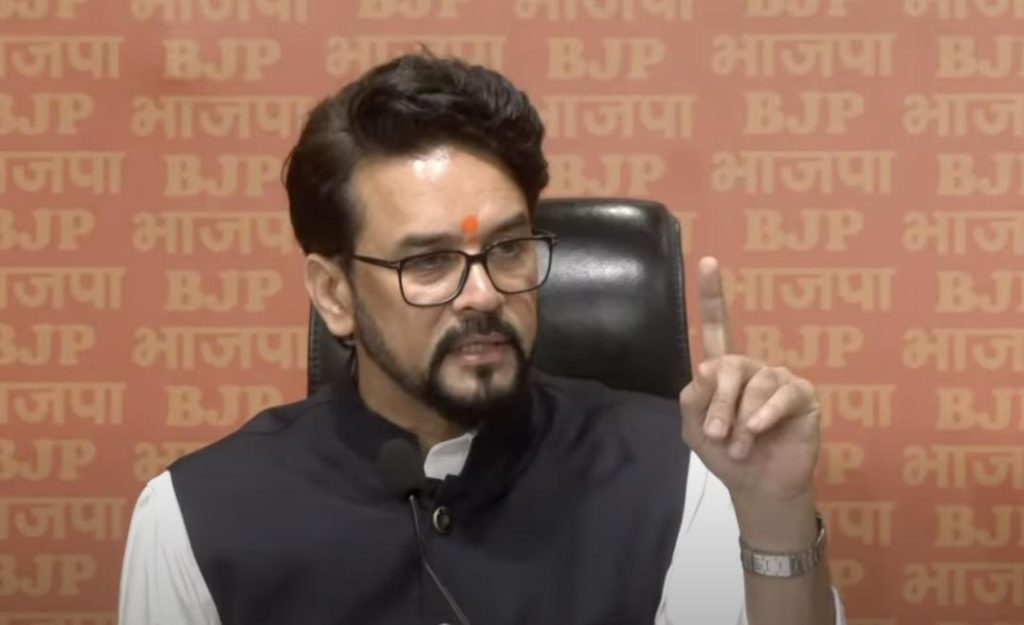
Congress & CPI made Bhimrao Ambedkar lose the poll in 1952: BJP
Bhimrao Ambedkar, a stalwart figure in Indian politics and the architect of the Indian Constitution, is known for his tireless efforts to uplift the marginalized sections of society, particularly the Dalits. However, his own electoral journey was not without its share of challenges. According to BJP MP Anurag Thakur, Ambedkar faced electoral defeat in the very first general election of 1952, courtesy of a coalition between the Congress and the Communist Party of India (CPI).
In a recent statement, Thakur claimed that the Congress and CPI together conspired to defeat Ambedkar in the 1952 election, ensuring that a constitution maker and a saint-like leader was eliminated in the very first election. The remarks have sparked a fresh debate on the alleged electoral malpractices of the Congress party, which has been accused of manipulating elections to further its own interests.
The 1952 general election was a landmark event in Indian electoral history, marking the first-ever direct elections to the Lok Sabha. Ambedkar, who was the chairman of the Drafting Committee of the Constitution, was a prominent candidate from the Scheduled Castes Federation, a party he had founded to champion the cause of Dalits. However, despite being a respected leader and a constitutional expert, Ambedkar faced stiff competition from his opponents.
According to Thakur, the Congress and CPI formed an alliance to defeat Ambedkar, which ultimately led to his electoral defeat. “Congress and CPI together defeated Dr Bhimrao Ambedkar, a constitution maker and saint-like leader, in the election,” Thakur said. “74,333 votes were rejected, which would have made a significant difference in the outcome of the election,” he added.
Thakur’s remarks have sparked a heated debate on social media, with many questioning the veracity of his claims. While some have praised Ambedkar for his unwavering commitment to social justice, others have criticized the BJP MP for attempting to exploit the legacy of a revered leader for political gain.
However, Thakur’s statement is not without its historical context. The 1952 election was marked by allegations of electoral malpractices, including booth capturing, rigging, and fraud. The Congress party, which was the dominant force in Indian politics at the time, was accused of using its vast resources and organizational network to influence the outcome of the election.
Furthermore, the CPI, which was a major opposition party, had also been involved in electoral politics for several years prior to the 1952 election. The party had contested several state and national elections, often partnering with other opposition parties to challenge the Congress’s dominance.
In the context of the 1952 election, the Congress and CPI’s alliance may have been seen as a strategic move to counterbalance the growing influence of Ambedkar’s Scheduled Castes Federation. Ambedkar’s party had emerged as a significant force in the election, with many Dalits and marginalized communities rallying behind him as a symbol of hope and empowerment.
Despite Ambedkar’s electoral defeat, his legacy continued to inspire generations of social activists and politicians. He remained a prominent figure in Indian politics until his death in 1956, and his contributions to the Indian Constitution and the struggle for social justice continue to be celebrated today.
In conclusion, while Thakur’s statement may be seen as an attempt to exploit Ambedkar’s legacy for political gain, it also highlights the complex and often contentious nature of Indian electoral politics. The 1952 election was a significant milestone in Indian history, marking the beginning of a new era of democratic governance. However, the allegations of electoral malpractices and manipulation that surrounded the election also underscore the need for greater transparency and accountability in the electoral process.
As India prepares for its next general election, it is essential to learn from the lessons of the past and ensure that the electoral process is fair, free, and transparent. By doing so, India can build a stronger and more resilient democracy, where all citizens have an equal voice and a stake in the political process.
Source: https://youtu.be/0kLyW5rSJSg






